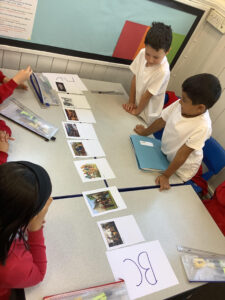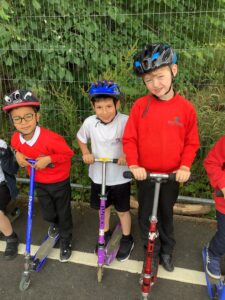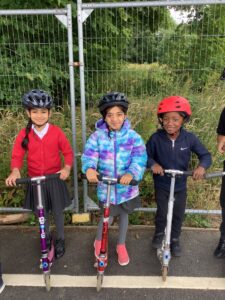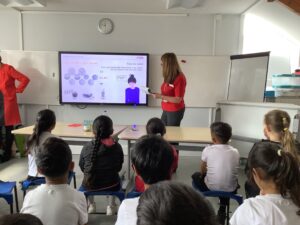We are biologists!
This half term, we have been learning as biologists.
We’ve learnt about living things and their habitats.
Last week, we ventured out into the front playground to conduct a invertebrate hunt.
The children looked around the habitat and recorded the number of invertebrates that they found.




We are historians!
This half term, we are historians.
We’re learning about Ancient Greece.
To kickstart our history topic, we have been learning about chronology and learning the order of time periods in history.
Year 3 placed some time periods of British history into chronological order on a timeline. Then, we added Ancient Greece to our timeline to compare what was happening elsewhere in the world with Britain. Ask your child if they can remember this learning!

The vocabulary that we are learning this half term is:
- period: a phase in time
- civilisation: a period of human development that is considered most advanced
- golden-age: a time when an activity or society is at its best
- government: the group of people responsible for ruling a country
- monarchy: a type of government ruled by a king or queen
- democracy: a type of government where the people living there make decisions
- oligarchy: a type of government where a small group of people make the decisions
- Parthenon: an important temple in Athens built during the Ancient Greek golden-age
23 September 2022
This week’s Talk Time brings together the learning that has happened in our Reading sessions last week. The Acceptable Use Agreements have been used in all classes as the stimulus for the reading lessons, as well as a copy being sent home to be agreed and signed.
Check out the KS1 and KS2 agreements.
After reading and discussing these agreements, do you feel these rules could apply outside of school too (e.g. at home or using the internet on your mobile phone)?
Do you think it’s a good idea to have agreed rules in place when using the internet?
Welcome back Year 3!
Year 3 have had a fantastic start to the new school year! They have all settled in really well and have been ready to learn.
Some key information to note:
Important days and dates
PE – Wednesday (swimming) and Thursday. On these days, please can your child come to school in their P.E. kit. On Wednesday (our swimming day) your child will need to bring a swimming costume, towel and a healthy snack. They may also bring goggles if they prefer.
Spelling and times tables tests – Friday
Reading record review in Book Club – Friday
Class assembly – Wednesday 12th October at 2:40pm
Water bottles
These must be brought to school daily to ensure your child is drinking enough water.
Milk
Please contact the office if your child would like to have milk in Year 3.
Homework
Whole school homework is set every Friday along with new spellings, a times table focus and a reading record activity to complete. On Friday, your child was sent home with a homework book and guide. This should be kept at home and it can be used for practising spellings, times tables or any additional home learning. Homework and spellings can also be accessed from the website.
Reading records
Every week, your child will be given an activity to complete from their reading record. These activities are an opportunity for your child to reflect on what they have been reading in a variety of different ways. The completed activity, accompanied by a signature from an adult at home, should be returned to school the following Friday for a review in class.
Daily practises
Numbots and TTRS – We continue to use Numbots and TTRS in Year 3 (using the same login as Year 2) and certificates will be awarded for children who earn the most coins and who complete the different stages. We also have a weekly class competition for effort on TTRS. Little and often (10/15 minutes a day) is recommended.
Reading – Please ensure that you read with your child for 10 minutes every day. Ask your child questions to assess their understanding whilst they read. Examples of what you could read include; books, magazines, comics, recipe books). Also, turn the subtitles on whilst your child watches television!
Uniform
Please do check the uniform policy to ensure your child is wearing the correct items including for PE days. Earrings must be removed on PE days.
Any questions, please ask!
Miss Needham
This week’s message (Friday 15 July 2022)
It’s our penultimate message of the year… This one’s a short one, but with two links to something longer if you’re interested…
Before we start the message, a note about extreme temperatures forecast for the first part of next week. The Department for Education is not advising that schools close; instead they have issued guidance to schools. The guidance sets out sensible points to follow – make sure you consider each of the following:
- make sure your child comes to school with a large bottle (it could have water previously frozen)
- your child should wear a sun hat and loose, cool clothing (we’re relaxing the rules around school uniform – replace uniform items with things that are cooler eg open sandals rather than shoes, uniform shorts with lighter PE shorts – try to stay as smart as possible)
- your child should be wearing Factor 50 sunblock when they arrive at school and may apply more during the day
In school, we’ll take as many actions as we can. These will include indoor lunchtimes, avoiding vigorous activity, and avoiding being in large groups in one indoor space for a longer time.
Governance
Governing bodies aren’t required to produce an annual report; however, Sphere Federation governors believe communicating with our school community is important. Check out their annual governance statement.
Summer Fun
Breeze is for all children and young people aged 0-19 from Leeds (and their families) who are looking for positive things to do. Although Breeze is run by Leeds City Council, the information they list comes from all sorts of organisations and partners working positively with children, young people and their families in Leeds, not just the council. Check out the 27 days of fun: Breeze in the Park.
Have a good weekend. Next week, look out for the return of our Summer competition!
Scooter training
Year 2 have learnt lots about being safe on their scooters today.
Here are some of their top tips!
Wait if you are ahead of your adult and always know where your adults are. Don’t go too far away from them.
Push your scooter across the road while you hold your adult’s hand. Do not scoot across a road.
On a pavement, scoot along the edge that is not near the kerb.
When braking, use your push foot and keep your other foot on the scooter.
Don’t do a flip or jump if you are scooting fast.
Always wear a helmet to keep safe! Make sure it is secure on your head.








Yorkshire Wildlife Park
Year 1 had an incredible time at the Yorkshire Wildlife Park on Thursday! The children were all brilliantly behaved and learnt so much about the different animals we saw. They also showed great perseverance because we did a lot of walking! During a workshop some of us were brave enough to hold a huge African land snail and a wriggly cockroach! Well done to everyone!







Yorkshire Wildlife Park
What a truly amazing day we had Yesterday at Yorkshire Wildlife Park! The children all had a brilliant time, were extremely well behaved and learned so much about animals from the visit. The workshop we attended was brilliant! The Brave Year 2 children held cockroaches and African land snails. They also learned more about the types of animals in Yorkshire Wildlife Park and how they look after them.















24 June 2022
This week’s spellings:
- puppet
- Monday
- Tuesday
- Wednesday
- Thursday
- Friday
- Saturday
- Sunday
- One
- won
The children will be tested on these words next Friday 1 July.
Please encourage your child to try practise the words by putting their words in a sentence using our handwriting guide. Also, look at the spelling activities guide for some ideas to practise these words.
Living and Learning: money workshop
Today, visitors, from HSBC, came to deliver a money workshop as part of our Living and Learning curriculum.
The workshop, to buy or not to buy, included learning about:
- the difference between a need and a want
- people making different choices about saving and spending money
- prioritising needs over wants
- saving for the things we want
Our visitors were very impressed with the knowledge and participation from the children. The visit supplemented our recent learning about money education so it was great to hear this.






